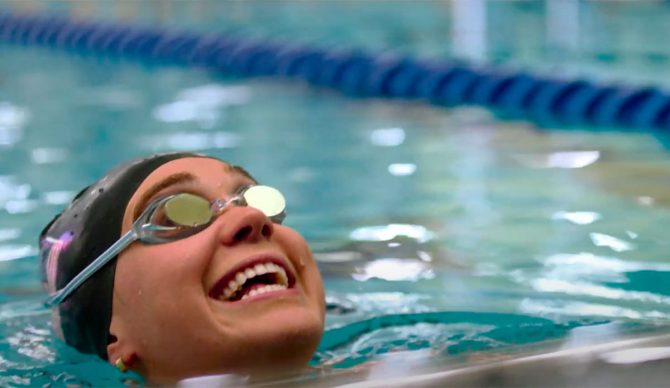
Ali Truwit is a true inspiration. One year after a shark took her foot, she landed a spot on the U.S. Paralympic swim team. Photo: YouTube//Screenshot
In the spring of 2023, Ali Truwit was looking forward to a lot of things in her life. As a Division 1 swimmer at Yale, water played a huge role in her life. Graduation was on the horizon, and she was going to take a trip to Turks and Caicos to mark the occasion. It was there, though, that she was attacked by a shark. In a blink of an eye, her whole life changed.
Truwit lost her left foot and part of her lower leg in the attack. Now, a year later, she didn’t give up on swimming. Instead, she became a part of the U.S. Paralympic swim team — and it didn’t take her all that long to do it.
When the shark attack happened, Truwit who is 23 as of this writing, was with her friend and fellow Yale swim team member Sophie Pilkinton. They were swimming off a boat when the shark hit them, and Truwit thinks that all that time in the water might’ve saved their lives.
“We kicked and shoved back, but it bit through my foot and we had to swim 50 to 75 yards back to the boat to save ourselves,” she told U.S. Paralympics Swimming. “Without that training, I’m not sure we would have made it back to the boat in the open ocean. In a story where a really unlucky thing happened, there was a lot of luck in who was around me.”
When they reached the boat, the severity of Truwit’s injuries were immediately apparent. Her foot was gone, and the skin on her lower leg was shredded. Pilkinton put a tourniquet on Truwit’s leg, and she was airlifted to a hospital in Miami.
Two intensive surgeries later, and Truwit was no longer battling an infection that set it. She went from Miami to a hospital in New York, where the decision was made to take her leg off just below the knee on order to have a more mobile life with a prosthetic leg.
After years of learning the proper motions that come with swimming at a very high level, Truwit struggled with retraining her body. Flip turns with one leg, head and hips in different positions, changing her breathing patterns, and fighting the pain. According to U.S. Paralympics Swimming, training for speed was one of the more difficult aspects, because it brought back some of that trauma that she experienced when she was swimming frantically for the boat.
“I was really fearful,” she recalled. “I still haven’t been back in open water. But the last time I heard the sound of water, we were swimming for our lives. I remember the whole attack; I was conscious the whole time. So it was hard to even hear the sound of water again and not have flashbacks to the attack, and that was definitely something I had to overcome, but it was important to not lose my love of the water.”
Within three months of the attack, despite all the hurdles, Truwit found herself back in a pool again for her first Para swimming meet at the Fred Lamback Georgia Para-Swimming Open. Then, a few months after that, she won silver at the U.S. Para swimming nationals.
Like any recovery process, Truwit found people to lean on. One in particular is Jessica Long, who had her lower legs amputated at 18 months old. Long is a powerhouse in paraswimming, with six Paralympics under her belt and 29 medals. Truwit’s prosthetist introduced them, and they became fast friends. They recently appeared on the Kelly Clarkson Show together and spoke about dealing with life-changing experiences.
“I spoke (on the show) about what a big gift and an inspiration she’s been as a para swimmer during these hugely transitional months that have been so life-changing, but also having her as a friend and a fellow female amputee is game-changing,” Truwit said. “Her confidence and how she shows her prosthetics proudly outside of the pool gave me strength and self-acceptance. She’s so strong, so real, so fast, and I’m lucky to have her in my life. And I could name so many more in paraswimming who’ve embraced me and really changed my trajectory in this first year as an amputee.”
Instead of getting focusing on what she can’t do anymore, Truwit chooses to focus on what she can.
“I’ve made it a priority to focus on what I still have and what I still can do, and the Paralympics and swimming has been invaluable in helping me to stick to that mindset as much as I can,” she said.
Then, in June, 2024, just a little over a year since she lost her foot, Truwit clinched a spot on Team USA at the Paralympics in Paris.
“Of course it’s really easy to sit and think, ‘Why did this happen to me?’ and be upset, and I’m working hard to focus on how I can make meaning of it and move forward, and this feels like a great way to do that,” she said. “I know it’s a super-fast turnaround, just over a year, and there’s a lot I have to accomplish, but I feel really excited to try… Some things I’ve lost, and I’ll never get them back. And that’s just my reality. But the things that I can get back, I’m going to fight for tooth and nail.”

